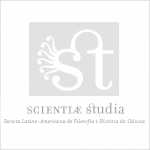A função do olho humano na óptica do final do século XVI
Vol. 3, No. 3 • Scientiae Studia
Autor: Claudemir Roque Tossato
Resumo:
Neste artigo, trato em linhas gerais do papel do olho humano no desenvolvimento das teorias ópticas no período que vai da Grécia antiga até o final do século xvi. São destacados dois grandes momentos da história da óptica: a antiguidade e o século XIII. Procuro levantar alguns dos principais pontos relativos à importância do olho humano no ato da visão, relacionando esses pontos a três tradições de pesquisa que serviram como base para a elaboração de teorias ópticas, a primeira filosófica, a segunda anatômica e a terceira matemática. A intenção é mapear a situação da óptica no que concerne à função do olho humano antes dos trabalhos revolucionários de Kepler nessa área no início do século XVII.
Abstract:
In this article, I deal in general lines with the role oh human eye in the development of optical theories in the period from ancient Greek to the end of sixteenth century. Two great moments of the history of optics are set for: Antiquity and the thirteenth century. I try to rise some of the main points related to the importance of human eye in the act of vision, relating these points to three research traditions which served as a base to the elaboration of optical theories, the first philosophical, the second anatomical, and the third matematical. The intention is to map the situation of optics as the function of the human eye before Kepler's revolutionary works at the beginning of seventeenth century.
DOI: http://dx.doi.org/10.1590/S1678-31662005000300004
Texto Completo: http://www.scielo.br/scielo.php?script=sci_arttext&pid=S1678-31662005000300004&lng=pt&nrm=iso&tlng=pt
Palavras-Chave: Óptica,Visão, Câmara escura,Anatomia,Perspect

Scientiae Studia
Associação Filosófica Scientiae Studia - Revista Scientiae Studia
